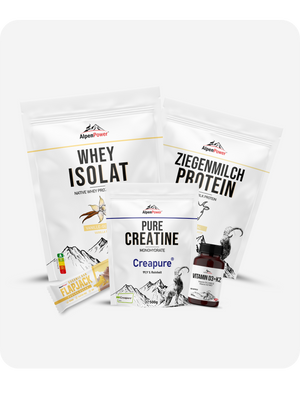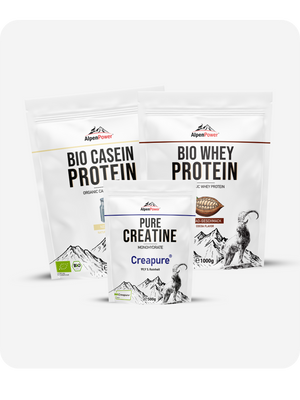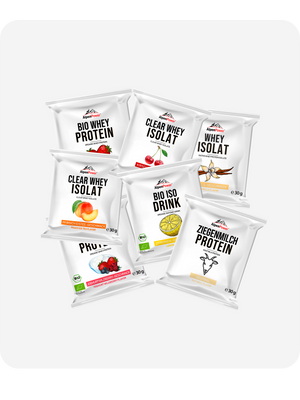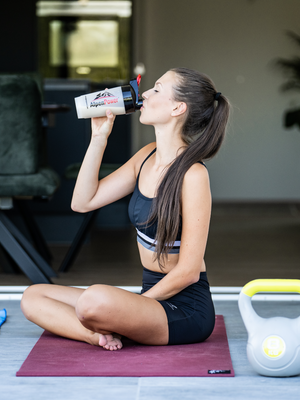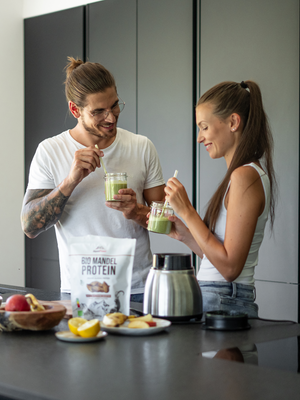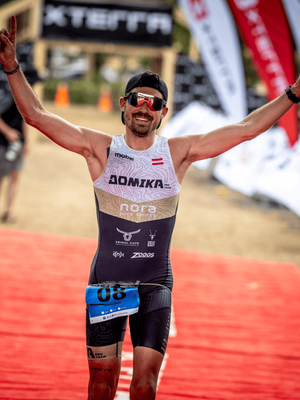The perfect balance for more performance & faster regeneration
In endurance sports, it is not only the training volume that determines success or failure - the individualized nutrition strategy is just as important. Especially in the area of long-distance training (>90 min), carbohydrates as primary energy suppliers and proteins to support regeneration and muscle integrity are essential building blocks. A targeted intake of these macronutrients, tailored to the training phase, intensity and individual needs, can significantly increase performance, optimize recovery and counteract overload symptoms.
AlpenPower products offer a well thought-out supplement on a natural basis - and make it easy to integrate performance-enhancing strategies into everyday training.

Carbohydrates: the limiting factor in long-term exercise
Carbohydrates are the performance-critical substrate source during intensive and prolonged exercise. Even at moderate intensity (>60% VO₂max), muscle glycogen turnover increases significantly - glycogen availability is therefore the limiting factor for endurance performance. Studies show a direct correlation between glycogen storage and exercise duration (Hawley & Burke, 2010).
Depending on the intensity and duration of training, a daily intake of 6-12 g of carbohydrates per kg of body weight is recommended (Burke et al., 2011). When preparing for competitions >90 minutes, targeted carbohydrate loading 36-48 hours before the start can maximize glycogen stores - intake levels of up to 10-12 g/kg bw/day are considered optimal here.
A regular intake of 30-60 g KH/h is also recommended during prolonged exercise to prevent hypoglycemia-related drops in performance and central fatigue. For very long or high-intensity units, the intake can be increased to 90 g/h - especially when using multiple carbohydrate sources (e.g. glucose + fructose) to increase the intestinal absorption rate (Jeukendrup, 2010).
AlpenPower Energy Gels and the Fast Carb Energy Drink provide precisely these quickly available carbohydrates from natural raw materials, without artificial additives - ideal for endurance athletes with high demands on purity and function.
Proteins: more than just muscle building
Even though proteins are primarily associated with strength sports, they are playing an increasingly recognized role in endurance training - both for muscle maintenance and for structural recovery after intensive exercise. Repeated muscular strain leads to microtraumas, the repair of which requires an adequate supply of high-quality proteins.
The literature recommends an intake of 1.2-1.6 g protein/kg bw/day for endurance athletes, depending on training load, objectives and total energy intake. Immediately post-exercise, a dose of 0.2-0.4 g/kg bw is recommended, ideally combined with carbohydrates in a ratio of 3:1 to 5:1 (Cermak et al., 2012). This combination not only promotes muscle protein synthesis, but also the resynthesis of glycogen stores.
Whey protein (whey) is particularly effective due to its rapid absorption and high leucine concentration. AlpenPower Organic Whey Protein provides high-quality, natural protein from pasture milk and is ideal for the recovery phase - free from artificial flavors, sweeteners or synthetic vitamins.

Practical implementation with AlpenPower products
Before training (3-4 hours before):
Example: Bar with organic whey protein + banana:
- Long-chain carbohydrates
- High-quality protein
- Easily digestible
- Glycogen build-up & satiety without feeling heavy
During training (>60 minutes):
Example: Bio Energy Gel or Fast Carb Energy
- Fast KH intake (30-60 g/h)
- Natural ingredients
- Optimal stomach tolerance
After training (within 30-60 minutes):
Example: organic recovery shake or whey + oatmeal + fruit, sweet potato, fish/lean meat or plant-based alternative with vegetables. Alternative with vegetables
- Rehydration
- KH-protein combination (3:1 to 4:1)
- Muscle regeneration & glycogen replenishment

Conclusion: Nutrition as a performance factor
Performance in long-distance training is not only determined by physiological parameters such as VO₂max or lactate threshold, but increasingly by intelligent nutritional strategies. The targeted combination of high-quality carbohydrates and readily available proteins can make the difference between a "good training day" and a real performance breakthrough. With AlpenPower's natural, functional products, these findings can be implemented simply, effectively and in a way that is suitable for everyday use - without compromising on quality or tolerability.
Author: Laura Bahmann
Sources:
- Hennessy et al. (2023) → Carbohydrate supplements (e.g. gels, drinks) improve endurance performance through glycogen and blood sugar stabilization PMC10054587
- Jeukendrup (2014) → 30-90 g KH/h recommended; mixed sugars (e.g. glucose + fructose) increase intake and performance PMID: 25355191
- Cermak et al. (2012) → Protein (0.2-0.4 g/kg) after endurance training promotes muscle regeneration & glycogen resynthesis PMID: 22237092
- Witard et al. (2025) → Endurance athletes benefit from 1.6-2.0 g protein/kg/day - especially during high training loads PMID: 40117058
